Neomieweru
On this page, you find all documents, package deals, and flashcards offered by seller neomieweru.
- 442
- 0
- 4
Community
- Followers
- Following
446 items
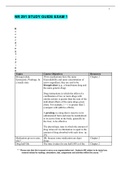
NR 291 STUDY GUIDE EXAM 1
NR 291 STUDY GUIDE EXAM 1 Recording 1:35:00 Topics Course Objectives Resources Bioequivalent, Synergistic, Prodrugs, In a steady state If two medications have the same bioavailability and same concentration of active ingredient, they are said to be bioequivalent (e.g., a brand-name drug and the same generic drug). Drug interactions in which the effect of a combination of two or more drugs with similar actions is greater than the sum of the individual effects of the same drugs ...
- Exam (elaborations)
- • 12 pages •
NR 291 STUDY GUIDE EXAM 1 Recording 1:35:00 Topics Course Objectives Resources Bioequivalent, Synergistic, Prodrugs, In a steady state If two medications have the same bioavailability and same concentration of active ingredient, they are said to be bioequivalent (e.g., a brand-name drug and the same generic drug). Drug interactions in which the effect of a combination of two or more drugs with similar actions is greater than the sum of the individual effects of the same drugs ...
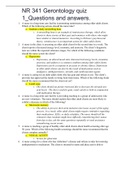
NR 341 Gerontology quiz 1_Questions and answers
NR 341 Gerontology quiz 1_Questions and answers. 1. A nurse in a long-term care facility is promoting reminiscence among older adult clients. Which of the following actions should the nurse take? a. Institute a daily storytelling hour i. A storytelling hour is an example of reminiscence therapy, which allow clients to share stories of their past and reminisce with others who might have similar or shared memories. According to Erikson’s psychosocial theory, reminiscence is an important actio...
- Exam (elaborations)
- • 4 pages •
NR 341 Gerontology quiz 1_Questions and answers. 1. A nurse in a long-term care facility is promoting reminiscence among older adult clients. Which of the following actions should the nurse take? a. Institute a daily storytelling hour i. A storytelling hour is an example of reminiscence therapy, which allow clients to share stories of their past and reminisce with others who might have similar or shared memories. According to Erikson’s psychosocial theory, reminiscence is an important actio...
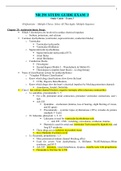
NR 291 Chapter 25: Antidysrhythmic Drugs
NR 291 STUDY GUIDE EXAM 3 Study Guide – Exam 3 60 Questions – Multiple Choice, Select All That Apply, Multiple Sequence Chapter 25: Antidysrhythmic Drugs • Which 3 electrolytes are involved in cardiac electrical impulses o Sodium, potassium, and calcium • Common dysrhythmias (ventricular, supraventricular, conduction blocks) o Ventricular Ventricular tachycardia Ventricular fibrillation o Supraventricular dysrhythmias Supraventricular tachycardia (SVT) ...
- Exam (elaborations)
- • 11 pages •
NR 291 STUDY GUIDE EXAM 3 Study Guide – Exam 3 60 Questions – Multiple Choice, Select All That Apply, Multiple Sequence Chapter 25: Antidysrhythmic Drugs • Which 3 electrolytes are involved in cardiac electrical impulses o Sodium, potassium, and calcium • Common dysrhythmias (ventricular, supraventricular, conduction blocks) o Ventricular Ventricular tachycardia Ventricular fibrillation o Supraventricular dysrhythmias Supraventricular tachycardia (SVT) ...
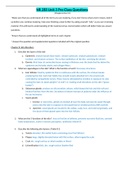
nr 283 unit 3
(Chapters 8 & 13) *Make sure that you understand all of the terms you are studying, if you don’t know what a term means, look it up before you continue studying. Take your thinking a step further by asking yourself “why” as you are reviewing material. This will lead to understanding of the material versus memorization which will better help you answer questions. *Ensure that you understand all highlighted terms in each chapter * Answer the question and supplemental questions included w...
- Exam (elaborations)
- • 12 pages •
(Chapters 8 & 13) *Make sure that you understand all of the terms you are studying, if you don’t know what a term means, look it up before you continue studying. Take your thinking a step further by asking yourself “why” as you are reviewing material. This will lead to understanding of the material versus memorization which will better help you answer questions. *Ensure that you understand all highlighted terms in each chapter * Answer the question and supplemental questions included w...
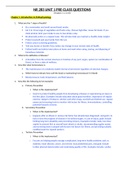
nr 283 unit 1
(Chapters 1, 2, & 21) Chapter 1: Introduction to Pathophysiology 1. What are the 7 steps of health? • Be a nonsmoker and avoid second-hand smoke. • Eat 5 to 10 servings of vegetables and fruits a day. Choose high-fiber, lower-fat foods. If you drink alcohol, limit your intake to one to two drinks a day. • Be physically active on a regular basis. This will also help you maintain a healthy body weight. • Protect yourself and your family from the sun. • Follow cancer screening gui...
- Exam (elaborations)
- • 7 pages •
(Chapters 1, 2, & 21) Chapter 1: Introduction to Pathophysiology 1. What are the 7 steps of health? • Be a nonsmoker and avoid second-hand smoke. • Eat 5 to 10 servings of vegetables and fruits a day. Choose high-fiber, lower-fat foods. If you drink alcohol, limit your intake to one to two drinks a day. • Be physically active on a regular basis. This will also help you maintain a healthy body weight. • Protect yourself and your family from the sun. • Follow cancer screening gui...
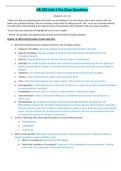
nr 283 unit 4
(Chapters 10 & 12) *Make sure that you understand all of the terms you are studying, if you don’t know what a term means, look it up before you continue studying. Take your thinking a step further by asking yourself “why” as you are reviewing material. This will lead to understanding of the material versus memorization which will better help you answer questions. *Ensure that you understand all highlighted terms in each chapter * Answer the question and supplemental questions included ...
- Exam (elaborations)
- • 8 pages •
(Chapters 10 & 12) *Make sure that you understand all of the terms you are studying, if you don’t know what a term means, look it up before you continue studying. Take your thinking a step further by asking yourself “why” as you are reviewing material. This will lead to understanding of the material versus memorization which will better help you answer questions. *Ensure that you understand all highlighted terms in each chapter * Answer the question and supplemental questions included ...
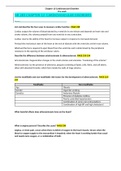
List and describe the four ways to measure cardiac function. PAGE 228
List and describe the four ways to measure cardiac function. PAGE 228 Cardiac output the volume of blood ejected by a ventricle in one minute and depends on heart rate and stroke volume, the volume pumped from one ventricle in one contraction. Cardiac reserve the ability of the heart to increase output in response to increased demand. Preload the mechanical state of the heart at the end of diastole with the ventricles at their max volume. Afterload the force required to eject blood from the ...
- Exam (elaborations)
- • 9 pages •
List and describe the four ways to measure cardiac function. PAGE 228 Cardiac output the volume of blood ejected by a ventricle in one minute and depends on heart rate and stroke volume, the volume pumped from one ventricle in one contraction. Cardiac reserve the ability of the heart to increase output in response to increased demand. Preload the mechanical state of the heart at the end of diastole with the ventricles at their max volume. Afterload the force required to eject blood from the ...
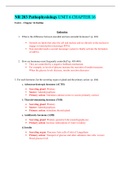
NR 283 Pathophysiology UNIT 6 CHAPTER 16
NR 283 Pathophysiology UNIT 6 CHAPTER 16 Unit 6 – Chapter 16 Outline Endocrine 1. What is the difference between steroidal and non-steroidal hormones? (p. 403) • Steroids are lipids that enter the cell and nucleus and act directly in the nucleus to engage in transcription (messenger RNA). • Non-steroidal needs a second messenger system to finally activate the formation of mRNA. 2. How are hormones most frequently controlled? (p. 403-404) • They are controlled by a negativ...
- Exam (elaborations)
- • 5 pages •
NR 283 Pathophysiology UNIT 6 CHAPTER 16 Unit 6 – Chapter 16 Outline Endocrine 1. What is the difference between steroidal and non-steroidal hormones? (p. 403) • Steroids are lipids that enter the cell and nucleus and act directly in the nucleus to engage in transcription (messenger RNA). • Non-steroidal needs a second messenger system to finally activate the formation of mRNA. 2. How are hormones most frequently controlled? (p. 403-404) • They are controlled by a negativ...
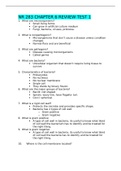
NR 283 CHAPTER 6 REVIIEW TEST 1
NR 283 CHAPTER 6 REVIIEW TEST 1 1. What are microorganisms? • Small living forms • Can grow in artificial culture medium • Fungi, bacteria, viruses, protozoa. 2. What is nonpathogenic? • Microorganisms that don’t cause a disease unless condition changes. • Normal flora and are beneficial 3. What are pathogens? • Disease causing microorganisms • Called germs 4. What are bacteria? • Unicellular organism that doesn’t require living tissue to survive 5. Chara...
- Exam (elaborations)
- • 9 pages •
NR 283 CHAPTER 6 REVIIEW TEST 1 1. What are microorganisms? • Small living forms • Can grow in artificial culture medium • Fungi, bacteria, viruses, protozoa. 2. What is nonpathogenic? • Microorganisms that don’t cause a disease unless condition changes. • Normal flora and are beneficial 3. What are pathogens? • Disease causing microorganisms • Called germs 4. What are bacteria? • Unicellular organism that doesn’t require living tissue to survive 5. Chara...
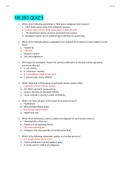
NR 283 QUIZ 5
NR 283 QUIZ 5 1. Which of the following statements is TRUE about malignant brain tumors? a. Most brain tumors arise from malignant neurons. b. Primary brain tumors rarely metastasize outside the CNS. c. The blood-brain barrier prevents secondary brain tumors. d. Brainstem tumors do not manifest signs until they are quite large. 2. Which of the following dietary supplements has reduced the incidence of spina bifida in recent years? a. Vitamin B6 b. Folic acid c. Vitamins A and D d. Zi...
- Exam (elaborations)
- • 5 pages •
NR 283 QUIZ 5 1. Which of the following statements is TRUE about malignant brain tumors? a. Most brain tumors arise from malignant neurons. b. Primary brain tumors rarely metastasize outside the CNS. c. The blood-brain barrier prevents secondary brain tumors. d. Brainstem tumors do not manifest signs until they are quite large. 2. Which of the following dietary supplements has reduced the incidence of spina bifida in recent years? a. Vitamin B6 b. Folic acid c. Vitamins A and D d. Zi...
